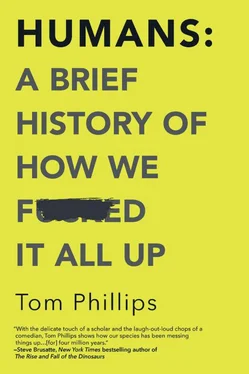Tom Phillips - Humans - A Brief History of How We F*cked It All Up
Здесь есть возможность читать онлайн «Tom Phillips - Humans - A Brief History of How We F*cked It All Up» весь текст электронной книги совершенно бесплатно (целиком полную версию без сокращений). В некоторых случаях можно слушать аудио, скачать через торрент в формате fb2 и присутствует краткое содержание. Город: Toronto, Год выпуска: 2019, ISBN: 2019, Издательство: Hanover Square Press, Жанр: История, Юмористические книги, на английском языке. Описание произведения, (предисловие) а так же отзывы посетителей доступны на портале библиотеки ЛибКат.
- Название:Humans: A Brief History of How We F*cked It All Up
- Автор:
- Издательство:Hanover Square Press
- Жанр:
- Год:2019
- Город:Toronto
- ISBN:978-1-48805-113-5
- Рейтинг книги:4 / 5. Голосов: 1
-
Избранное:Добавить в избранное
- Отзывы:
-
Ваша оценка:
- 80
- 1
- 2
- 3
- 4
- 5
Humans: A Brief History of How We F*cked It All Up: краткое содержание, описание и аннотация
Предлагаем к чтению аннотацию, описание, краткое содержание или предисловие (зависит от того, что написал сам автор книги «Humans: A Brief History of How We F*cked It All Up»). Если вы не нашли необходимую информацию о книге — напишите в комментариях, мы постараемся отыскать её.
Humans: A Brief History of How We F*cked It All Up — читать онлайн бесплатно полную книгу (весь текст) целиком
Ниже представлен текст книги, разбитый по страницам. Система сохранения места последней прочитанной страницы, позволяет с удобством читать онлайн бесплатно книгу «Humans: A Brief History of How We F*cked It All Up», без необходимости каждый раз заново искать на чём Вы остановились. Поставьте закладку, и сможете в любой момент перейти на страницу, на которой закончили чтение.
Интервал:
Закладка:
They started to realize that this was going a bit wrong when it became apparent that some empresarios were gaining significant political power—and many settlers were unwilling to integrate and obey the laws of the Mexican government. Freaked out, in 1830 the Mexicans abruptly tried to ban any further American migration, but found themselves powerless to stop the influx of American immigrants pouring across the border.
Things came to a head when the (relatively) liberal Mexican government was replaced by an autocratic, authoritarian ruler in president Antonio López de Santa Anna, who in 1835 dissolved the Mexican congress and pushed through major changes to the country’s constitution that centralized power, effectively making him a dictator. He also started to forcefully suppress dissent in Texas, a crackdown on the American immigrant community that only inflamed tensions further—and soon a full-scale rebellion was on the cards. By 1836, after a war that included the infamous events of the Alamo, Texas had declared its independence. By 1845, it was part of the ever-expanding United States, and rather than having a useful buffer against American expansion, Mexico had lost a valuable province.
There are a couple of divergent lessons we can draw from this. On the one hand, there’s “don’t encourage immigration only to later turn against those same immigrant communities.” On the other, there’s also “don’t assume that you’ll always be a democracy because THAT’S EXACTLY WHEN THINGS GO WRONG.”
Democracy, of course, does rely somewhat on the voters making good decisions in the first place. For example, in 1981 the small Californian town of Sunol elected a dog as their mayor. Bosco Ramos, a black Labrador mix, beat two human candidates in a landslide victory after his owner, Brad Leber, entered him into the race following an evening of talking shit at a local bar. In fairness to Bosco and the voters of Sunol, this actually seems to have worked out fine—Bosco was widely hailed as a very good boy, and served as mayor for over a decade, ending only with his death in 1994. One resident recalled to the San Jose Mercury News in 2013 that the mayor “used to hang in all the bars and he used to growl at you if you didn’t feed him,” and he was rumored to have fathered numerous puppies with different bitches around town, which sounds like pretty standard politician behavior to be honest. Bosco is fondly remembered in Sunol, where a bronze statue of him stands to this day, and his tenure only involved one major international incident—when in the wake of the Tiananmen Square massacre the Chinese newspaper People’s Daily used the example of Bosco to attack Western democracy on the grounds that “there is no distinction between people and dogs.” Bosco ended up joining a group of Chinese students on a pro-democracy protest outside the Chinese consulate in San Francisco.
Bosco’s election may have been unexpected, but he doesn’t even come close to being the weirdest nonhuman victor of an election. That honor probably goes to Pulvapies, a brand of foot powder that was elected mayor of the Ecuadorian town of Picoaza in 1967. Pulvapies wasn’t even officially standing in the election, but its maker did run a joke marketing campaign across the country with the slogan “Vote for any candidate, but if you want well-being and hygiene, vote for Pulvapies.” Come election day, Pulvapies received thousands of write-in votes in several areas—and in Picoaza, the foot powder somehow managed to come out in first place, much to the chagrin of the numerous human candidates.
Still, as unorthodox as electing nonhuman politicians might be, if you want to achieve a really impressive democratic screw-up, your best bet is still to elect a human—as demonstrated by the fact that making a brand of foot powder mayor isn’t even the worst electoral decision in Ecuador’s recent history.
Instead, that honor probably goes to the election of Abdalá Bucaram as the country’s president in 1996. Bucaram, a former police commissioner, mayor and occasional rock singer who campaigned under the self-bestowed nickname “El Loco” (“The Madman”), was swept to a shock victory after a populist presidential campaign that attacked the country’s elites. As a police commissioner he had been notorious for the way he “chased down women wearing miniskirts, jumping off his motor scooter and ripping out hems to make their skirts longer,” as the New York Times reported when he was elected. As a mayor he also had a track record of shaking down local businesses for payments, and in 1990 he had fled to Panama to avoid corruption charges. During the presidential election campaign, his unconventional rallies and campaign adverts—which often involved him singing, accompanied by the band that went everywhere with him on the campaign trail—galvanized the country’s working class, who were promised that Bucaram would bring an end to the neo-liberal policies of privatization and austerity that the nation’s political class were committed to. Things that might have proved career-ending for other politicians—you know, stuff like the way he had a Hitler mustache and once said that Mein Kampf was his favorite book—didn’t seem to be much of a barrier to his success.
Once he was in power, the country’s poor who had voted for him were somewhat surprised at the economic plan he unveiled a few months into his term: a neo-liberal program that extended privatization and doubled down on austerity, the exact things he’d been elected to stop. Oh, and he tried to remove the term limits on the presidency. And went off-script in his speech announcing the economic policy to mount a lengthy attack on a newspaper that had been critical of him.
He continued his commitment to eccentric behavior while in office, including releasing a song titled “A Madman Who Loves,” meeting with Lorena Bobbitt (the woman who became famous for cutting off her husband’s penis) and selling his Hitler mustache for charity. Also, if press reports at the time were accurate (again, it can occasionally be hard to tell what accusations are true and what are just scuttlebutt), he also put his teenage son in unofficial charge of the customs service, and they reportedly threw a party celebrating the son making his first million dollars. The minimum wage in Ecuador at the time was $30 a month, so you can see why that might have annoyed some people.
Not unsurprisingly, popular opinion rather quickly turned against Bucaram, prompting massive street protests against his reign, and he was impeached and removed from the presidency a mere six months into his term, on the grounds that he was “mentally incompetent.” (That was almost certainly just a pretext, but if you’re going to campaign as “El Loco,” then you probably haven’t left yourself much of a leg to stand on.) He was also charged with embezzling millions of dollars, and promptly fled—again—to exile in Panama. There are various lessons that we can take from all this, but probably the main one is: “If somebody has a Hitler mustache, then, uh, that might be a bit of a red flag?”
Speaking of which… you can’t really talk about democracy’s capacity to go rapidly and nightmarishly wrong without talking about, well, Hitler.
Look, I know what you’re thinking. Putting Hitler in a book about the terrible mistakes we’ve made as a species isn’t exactly the boldest move ever. “Oh wow, never heard of him, what a fascinating historical nugget” is something you’re probably not saying right now.
But beyond him being (obviously) a genocidal maniac, there’s an aspect to Hitler’s rule that kind of gets missed in our standard view of him. Even if popular culture has long enjoyed turning him into an object of mockery, we still tend to believe that the Nazi machine was ruthlessly efficient, and that the great dictator spent most of his time… well, dictating things.
Читать дальшеИнтервал:
Закладка:
Похожие книги на «Humans: A Brief History of How We F*cked It All Up»
Представляем Вашему вниманию похожие книги на «Humans: A Brief History of How We F*cked It All Up» списком для выбора. Мы отобрали схожую по названию и смыслу литературу в надежде предоставить читателям больше вариантов отыскать новые, интересные, ещё непрочитанные произведения.
Обсуждение, отзывы о книге «Humans: A Brief History of How We F*cked It All Up» и просто собственные мнения читателей. Оставьте ваши комментарии, напишите, что Вы думаете о произведении, его смысле или главных героях. Укажите что конкретно понравилось, а что нет, и почему Вы так считаете.












